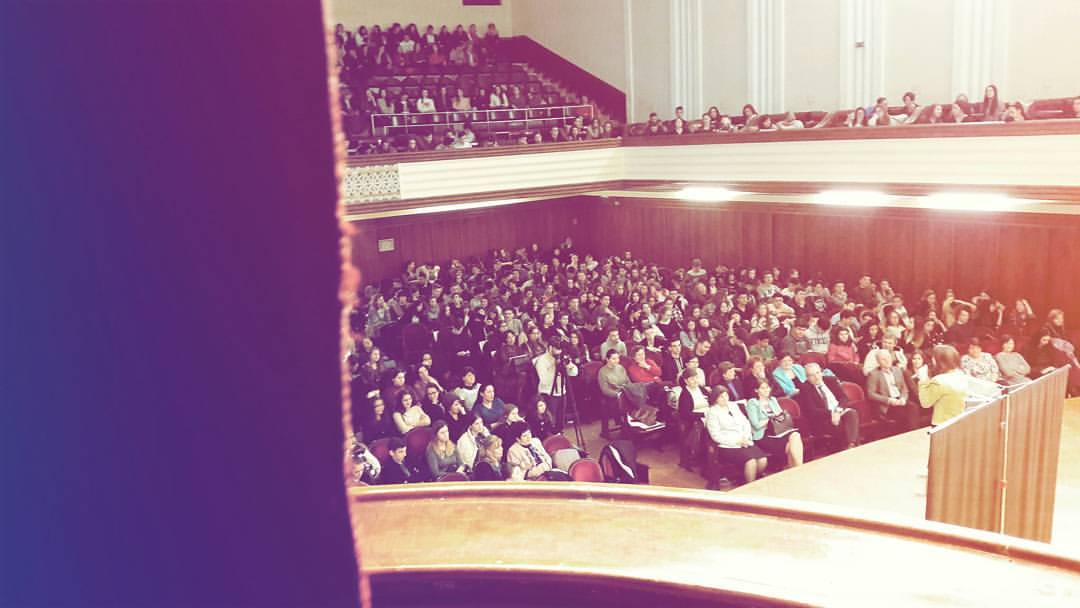13 February 2017, Auditorium Maximum Hall, Cluj-Napoca
600 students & 65 teachers from 25 highschools from Cluj
Article & photo album at:
 The conference took place on the 13th of February, 2017. There were over 600 students and 65 teachers from 25 schools from Cluj that participated in the Auditorium Maximum Hall. The Conference started at 12.30 and ended at 3 pm. Our school was the main organiser, in the context of an Erasmus+ KA2 School Partnership that we coordinate at European level, the Math Around Us Project (https://twinspace.etwinning.net/9782). Our partners were the Cluj County School Inspectorate, Casa Corpului Didactic Cluj and 4 Faculties of Babes-Bolyai University: the Mathematics and Informatics Faculty, the Physics Faculty, Faculty of European Studies and the Chemistry and Chemical Engineering Faculty. There were 5 speakers that held presentations on the topic of Interdisciplinarity in the study of Sciences/ STEM: Mrs Andreea Suciu that presented the Math Around Us project that studies math in relationn to different fields, like Math in Sciences, Math in Arts, Math in Music, Math in Astronomy etc (co-financed by the European Comission through the Erasmus+ programme), Mrs Ariana-Stanca Vacaretu who is a Scientix Ambassador (2016-2019) and who presented the Scientix platform, Mr Alexandru Marcu, professor at the Physics Faculty, who presented Math in relation with Astrophysics, Mrs Veronica Ilea from the Mathematics and Informatics Faculty who presented mathematical functions applied to Biology, Economy and population growth, Mr. Csaba Nagy from the Chemistry and Chemical Engineering Faculty and Mr. Mircea Bertea from the Faculty of European Studies who talked about the concept of Inter- and transdisciplinarity.
The conference took place on the 13th of February, 2017. There were over 600 students and 65 teachers from 25 schools from Cluj that participated in the Auditorium Maximum Hall. The Conference started at 12.30 and ended at 3 pm. Our school was the main organiser, in the context of an Erasmus+ KA2 School Partnership that we coordinate at European level, the Math Around Us Project (https://twinspace.etwinning.net/9782). Our partners were the Cluj County School Inspectorate, Casa Corpului Didactic Cluj and 4 Faculties of Babes-Bolyai University: the Mathematics and Informatics Faculty, the Physics Faculty, Faculty of European Studies and the Chemistry and Chemical Engineering Faculty. There were 5 speakers that held presentations on the topic of Interdisciplinarity in the study of Sciences/ STEM: Mrs Andreea Suciu that presented the Math Around Us project that studies math in relationn to different fields, like Math in Sciences, Math in Arts, Math in Music, Math in Astronomy etc (co-financed by the European Comission through the Erasmus+ programme), Mrs Ariana-Stanca Vacaretu who is a Scientix Ambassador (2016-2019) and who presented the Scientix platform, Mr Alexandru Marcu, professor at the Physics Faculty, who presented Math in relation with Astrophysics, Mrs Veronica Ilea from the Mathematics and Informatics Faculty who presented mathematical functions applied to Biology, Economy and population growth, Mr. Csaba Nagy from the Chemistry and Chemical Engineering Faculty and Mr. Mircea Bertea from the Faculty of European Studies who talked about the concept of Inter- and transdisciplinarity.
The Math Around Us Erasmus+ project started in 2015. Its main aim is to promote an interdisciplinary approach to the study of math and other sciences and study fields. It has 8 topics out of which 7 were already studied in the classrooms of the 8 school partners involved in the project: Math in the Science Lab, Math in Arts, Math in Music, Math in the Environment, Math in Astronomy, Math in ICT, Math in Archaelogy and Math in Geograhy.
As the project approaches its ending, we thought of offering the large community of schools in our city the opportunity to see its results and maybe feel inspired by our ideas. In Romania, Sciences are studied individually, at different subjects and sometimes the curriculum of Math for example, is not in line with the one from Chemistry, Biology or Physics. Thus, the students' tendency to fail to see that the Sciences can be studied as a ”whole” and understood better if we use an interdisciplinary approach.